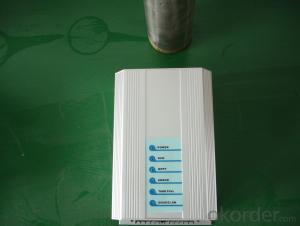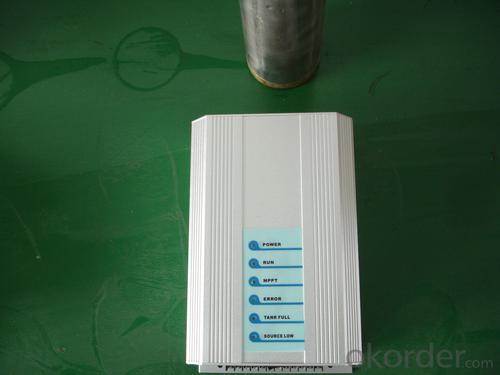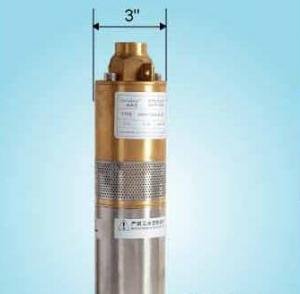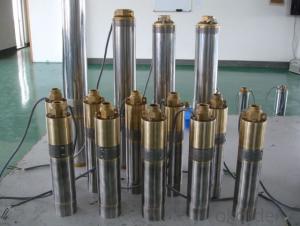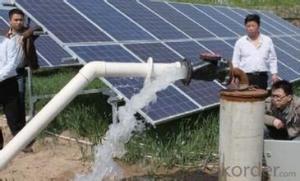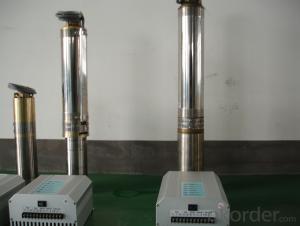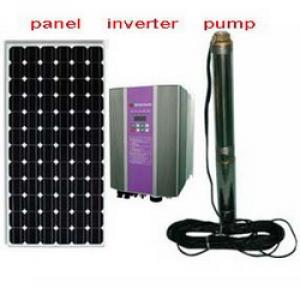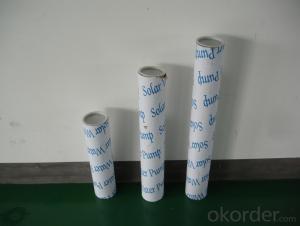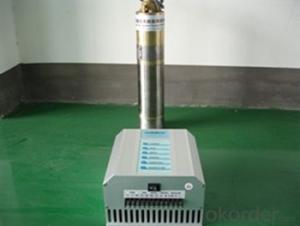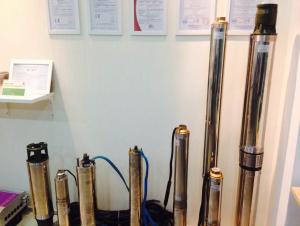DC SOLAR WATER PUMP
- Loading Port:
- China Main Port
- Payment Terms:
- TT OR LC
- Min Order Qty:
- -
- Supply Capability:
- -
OKorder Service Pledge
OKorder Financial Service
You Might Also Like
Item Description :
This superb new addition to our solar fountain range comes with a 10w solar panel,and a powerful fountain pump that is capable of producing fountains of up to 2m in height. As well as being easy to set up and use.Instruction manual is supplied for assembly and maintenance.
Solar Fountain Key Features :
Powered by direct sunlight
No high voltage electric mains required
Safe for children
Max. height of fountain: 2M
Max. flow capacity: 800 L/H(176 GAL)
10W Polycrystalline solar panel included
18V DC brushless pump
Solar Pump Features :
Can produce fountains up to : 2M (tube height) 1.4M (fountain height)
Comes with multiple nozzle accessories
Cable Length : 5M
Solar Panel Features :
10W peak power.
Polycrystalline highly efficient solar panel
Comes mounted in aluminium frame
Comes with ground stake and rotating knob so you can angle your panel toward the sun
What You Will Get :
10W solar panel
Solar pump
Ground Sake
Nozzle accessories
Precautions :
DO NOT alter or change the product itself or its components
Operate pump in freshwater only, never above 50 degrees celsius
Keep away from flammable liquids
Do not connect to any other power supply other than the included
- Q: How does the distance between the solar panels affect the performance of a solar pump?
- The distance between solar panels can affect the performance of a solar pump in a few ways. Firstly, if the panels are too far apart, it can lead to voltage drop and decreased efficiency as the electricity has to travel a longer distance. Secondly, a larger distance can result in increased resistance in the wiring, leading to energy losses and reduced pump performance. Additionally, the angle and orientation of the panels can also be affected by the distance between them, impacting the amount of sunlight they receive and therefore affecting the overall efficiency of the solar pump system.
- Q: How do solar pumps handle fluctuations in water demand?
- Solar pumps can handle fluctuations in water demand by automatically adjusting their speed and output based on the amount of sunlight available. When there is more sunlight, the pumps work at a higher capacity to meet the increased demand, and when there is less sunlight, they operate at a lower capacity to conserve energy and adapt to lower water demand. This flexibility allows solar pumps to efficiently and effectively manage fluctuations in water demand.
- Q: Can a solar pump be used in areas with limited sunlight?
- A solar pump can still be used in areas with limited sunlight, but its efficiency and performance may be affected. The amount of sunlight directly impacts the pump's ability to generate power and pump water. In areas with limited sunlight, the pump may operate at a reduced capacity or require additional energy sources to compensate for the lack of sunlight.
- Q: Are there any size limitations for a solar pump system?
- There are no specific size limitations for a solar pump system, as it can be designed and customized to meet the specific needs of different applications, ranging from small-scale residential systems to large-scale commercial or industrial setups. The size of the solar pump system primarily depends on factors such as the required flow rate, total dynamic head, available solar energy, and the volume of water that needs to be pumped.
- Q: How does a solar pump help in reducing the risk of waterborne illnesses?
- A solar pump helps in reducing the risk of waterborne illnesses by providing a reliable and sustainable source of clean water. It eliminates the need for manual labor or reliance on unreliable electricity sources, ensuring a consistent supply of safe water for drinking, cooking, and sanitation. This reduces the dependence on contaminated water sources, which are often breeding grounds for waterborne diseases, and thus helps in preventing the spread of illnesses caused by pathogens present in unclean water.
- Q: What is the expected maintenance schedule for a solar pump?
- The expected maintenance schedule for a solar pump can vary depending on several factors such as the type and model of the pump, the quality of components used, the environmental conditions it operates in, and the level of usage. However, in general, a solar pump requires minimal maintenance compared to traditional pumps due to its simple design and reliance on renewable energy. Routine maintenance for a solar pump typically involves the following tasks: 1. Regular cleaning: The solar panels should be kept clean and free from dust, dirt, and debris to ensure optimal sunlight absorption and maximum efficiency. Cleaning can be done with a soft cloth or sponge and mild detergent, avoiding abrasive materials that may scratch the surface. 2. Inspection of wiring and connections: It is important to periodically inspect the electrical wiring and connections to ensure they are secure and free from any signs of wear or damage. Loose or faulty connections can lead to reduced performance or system failure. 3. Checking water levels: Depending on the type of solar pump and its application, regular monitoring of water levels may be necessary. This is especially important for pumps used in irrigation systems or remote water supply, as low water levels can cause the pump to overheat or run dry, potentially damaging the motor or pump components. 4. Lubrication: Some solar pumps may require occasional lubrication of moving parts, such as bearings or seals. This will help prevent friction and ensure smooth operation. It is essential to use the recommended lubricant and follow the manufacturer's guidelines for proper application. 5. Battery maintenance: For solar pumps with battery backup systems, it is crucial to monitor and maintain the batteries. This includes checking the charge level, cleaning battery terminals, and replacing batteries if necessary. Proper battery maintenance is essential for consistent pump performance, especially during periods of low sunlight or at night. 6. Professional servicing: While routine maintenance can be carried out by the user, it is recommended to have a professional service the solar pump periodically. This allows for a thorough inspection, testing of system components, and identification of any potential issues that may require attention. It is important to note that the specific maintenance requirements for a solar pump may be outlined by the manufacturer in the user manual or documentation. Following the recommended maintenance schedule and guidelines provided by the manufacturer will ensure optimal performance and longevity of the solar pump.
- Q: How does the energy usage of a solar pump system vary with different pumping depths?
- Different pumping depths can lead to varying energy usage in a solar pump system. Typically, the deeper the pumping depth, the more energy is necessary to pump water. This is due to the fact that as the water level decreases, the pressure head increases, which demands more effort from the pump. In a solar pump system, solar panels play a crucial role in generating energy. These panels convert sunlight into electricity to power the pump. The amount of energy produced by the solar panels is influenced by factors such as the presence of sunlight, panel efficiency, and any shading or obstructions that might affect the panels' output. When it comes to pumping water from different depths, the energy usage of the solar pump system is impacted by two primary factors: the vertical distance the water needs to be pumped (referred to as the pumping head) and the horizontal distance the water needs to be pumped (known as the pumping distance). The pumping head is directly related to the depth of the water source. As the depth increases, so does the pumping head, requiring the pump to exert more energy to lift the water against gravity. Consequently, this results in higher energy consumption. Similarly, the pumping distance can also affect the energy usage of a solar pump system. The greater the horizontal distance the water needs to be pumped, the more energy is necessary to overcome friction losses in the pipes. In conclusion, it can be inferred that the energy usage of a solar pump system generally rises with greater pumping depths. However, it is important to note that advancements in solar panel technology and pump efficiency can help optimize energy consumption and minimize the impact of pumping depth on energy usage.
- Q: Can a solar pump be integrated with existing water systems?
- Indeed, it is feasible to incorporate a solar pump into current water systems. Solar pumps are designed to be adaptable and can be effortlessly linked to existing water systems. The primary prerequisite is a solar energy source, typically in the form of solar panels, to supply power to the pump. Once the solar panels are connected to the pump, appropriate plumbing connections can be employed to integrate it into the existing water system. Consequently, the solar pump can extract water from the source and distribute it through the pre-existing pipelines, tanks, or irrigation systems. Although the integration process may vary depending on the specific configuration of the water system, it is absolutely possible to seamlessly integrate a solar pump into an existing water system with the appropriate expertise and equipment.
- Q: Can a solar pump be used for rainwater harvesting?
- Yes, a solar pump can be used for rainwater harvesting. Solar pumps are highly efficient in converting solar energy into mechanical energy to pump water. This makes them an ideal choice for rainwater harvesting systems as they can extract and store rainwater for various uses such as irrigation, domestic purposes, or even groundwater recharge. Additionally, solar pumps are environmentally friendly and cost-effective in the long run, making them a sustainable option for rainwater harvesting.
- Q: Can a solar pump be used in areas with extreme weather conditions?
- Solar pumps can indeed be utilized in regions with harsh weather conditions. These pumps are specifically engineered to endure a range of weather circumstances, encompassing intense heat, cold, and precipitation. They are constructed using resilient materials and are tightly sealed in order to safeguard them from moisture and dust. Moreover, solar pumps are outfitted with protective systems against temperature fluctuations and excessive voltage, guaranteeing their secure operation even in the most extreme weather conditions. Nevertheless, it is crucial to select a solar pump that is explicitly tailored for the anticipated weather conditions to ensure the highest level of performance and durability.
Send your message to us
DC SOLAR WATER PUMP
- Loading Port:
- China Main Port
- Payment Terms:
- TT OR LC
- Min Order Qty:
- -
- Supply Capability:
- -
OKorder Service Pledge
OKorder Financial Service
Similar products
Hot products
Hot Searches
Related keywords
